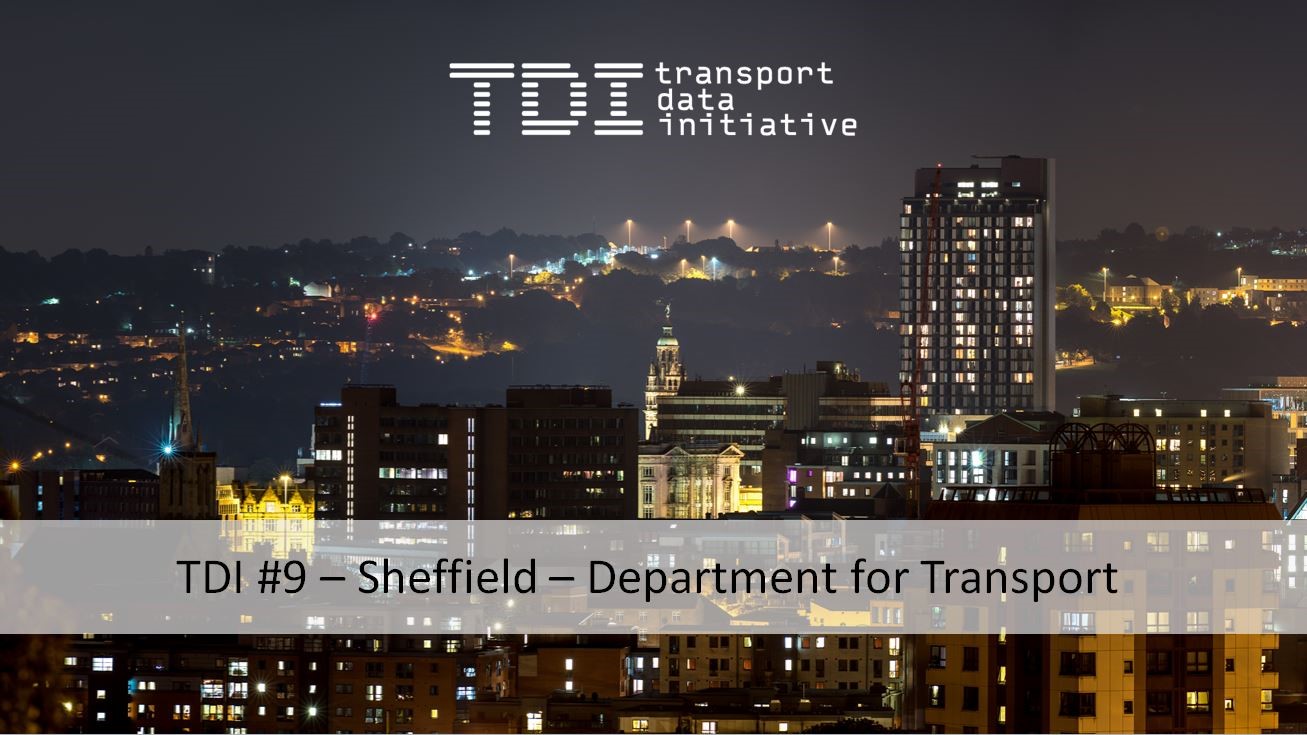
The Transport Data Initiative (TDI) was founded in 2016. Set up by local authorities, its goal is to help its members improve the way they collect, store, and use data to make transport services better while reducing the costs of delivery.
The TDI is a partnership led by Buckinghamshire County Council and funded by Innovate UK. I sit on its steering group as the representative for the Department for Transport. The TDI runs regular events across the country to discuss data in transport. I was honoured to be asked to compère the 9th meeting in Sheffield recently.
An engaging event in Sheffield
The main themes of this event were:
- updating the local authority community on the work on data that we are doing at DfT and, more widely, within the UK government network
- highlighting the opportunities that data can unlock in transport
- engaging with local authorities to discuss how the department can work with them to make these opportunities a reality
It was great to see the event full to capacity, with over 60 attendees representing councils across the country. Around 150 people joined online throughout the day via a live video stream and engaged with the event with questions and comments on social media. The conversations were engaging and challenging, with participants offering a lot of food for thought from a variety of perspectives.
An overview of digital and data in transport
The opening session highlighted how data and digital technologies had delivered customer benefits and operational efficiencies in other sectors. The Department for Transport is keen to see a similar step change in transport. This is reflected in the emphasis on data in the Future of mobility: urban strategy part of the government’s Industrial Strategy.
A summary was then provided of the work already being done by DfT and others – for example, the Joint Rail Data Action Plan, the Bus Open Data Programme, the Local Data Action Plan and forthcoming work such as the Transport Data Strategy and the Future of Mobility Regulatory Review.
Local transport is on the brink of a revolution
Graham Hanson, Head of Smarter Traffic Management at DfT, outlined the progress being made with the Local Data Action Plan. Specific actions include:
- the launch of a competition to help local authorities open up their data
- an agile discovery to streamline and digitise traffic regulation orders, the legal instrument used by local authorities to regulate the use of certain roads
- a feasibility study into establishing a metadata catalogue for transport data
- local authority mobility platform research, exploring how urban traffic control management systems can be modernised to provide multi-modal open transport data and encourage third party innovation
Darren Capes, ITS policy lead at DfT, and John Cooper, senior ITS engineer at DfT, provided more detail on the local authority mobility platform research. This is a project being undertaken by the Connected Places Catapult, which involves developing use cases such as:
- electric vehicles
- in-vehicle traffic signs
- autonomous vehicles
- freight management, including routes and parking
- routing for all vehicles
- smart parking
- Bluetooth vehicle data
Challenges and opportunities are becoming increasingly clear
There was an ‘ask DfT’ session, where department officials responded directly to queries from the audience. The variety of topics and angles covered was intriguing:
- how best to get third parties to share their data
- the importance of revenue funding as well as capital for innovative initiatives
- the need for commercial and economic analysis of new business models to encourage data sharing
- the potential role of crowdsourcing data
- data standards
- new mobility modes and micromobility
- the challenges with procurement in innovation
Many of these topics will be examined as part of the Future of Mobility Regulatory Review and the Transport Data Strategy.
How to get involved
There are several ways to get involved.
The first is to contribute to the final session of the event, which has an online counterpart. In the session, Abbas Lokat, a senior consultant with GeoPlace, hosted a workshop on the traffic regulation order discovery project, which seeks to understand:
- the costs associated with the creation of traffic regulation orders
- to what extent the features associated with these have been digitised
- the data that local authorities would find useful
This project is still running. If you wish to provide input, please visit the GeoPlace web page about the TRO Discovery Project.
A second way to contribute is to attend the next Transport Data Initiative event, the 10th. It will be held on 19 June in Bristol, and will focus on procurement, skills, and new business models – please check the TDI website for registration details.
You can also:
- subscribe to the Transport Data Initiative monthly newsletter
- contact the TDI by email at TDI@buckscc.gov.uk
- find TDI on LinkedIn
- follow TDI on Twitter